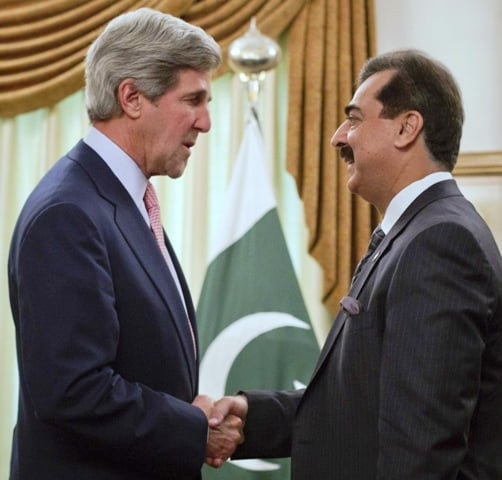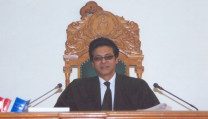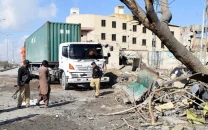Between a rock and a hard place
It is not time for Pakistan to isolate itself in the world and follow ‘strategic defiance’.

The senator also met the Pakistan army chief the same day and according to an ISPR press release, the latter “apprised” the former of the “intense feeling of rank and file of Pakistan Army on the Abbottabad incident”. Several US news organisations said, quoting a “Pakistani official” that the senator had “presented” the army chief with a “list of demands”. Although these have not been made public, one can make an educated guess that these would be related to the alleged presence of Mullah Omar in Pakistan and/or the reluctance of the military to, so far, launch an operation in North Waziristan.
The speculation in the media was that there would have been tough talk between them and with the prime minister and the president, whom he met on May 16. And this is being said for two reasons. One, that before leaving for Pakistan, Senator Kerry had told his American audience that he would press the Pakistani leadership to demonstrate “real commitment to fight terrorism”. And two, the military, fortified by a defiant joint resolution of parliament, would signal to the US that it was no longer a pushover. Is the ‘friendly senator’ here to deliver a stern, terminal warning which America delivered to Pakistan in 2001?
The fact is that today, the situation is different. The US has not gone to the UN on the matter of al Qaeda, although it may have the European Union behind it. Operation Geronimo was not in the same category as the Nato-Isaf assault on Afghanistan, and there are questions about the legality of what America has done. On the other hand, is Pakistan in a defiant posture today that it was not when General Musharraf submitted to the American threat in 2001 and the Foreign Office in Islamabad took the UN resolutions seriously? Has parliament given a charter of reckless diplomacy to those who handle our foreign policy?
There are two aspects to the reactions that have taken place on both sides after the Abbottabad operation. In the US, there is understandable outrage in the public which is dangerously undivided on the hard line the media is generally recommending. Yet, in the Obama Administration and among the Democrats in Congress, there is a word of caution on how to handle Pakistan after Osama’s death. This strand of thinking is of the view that care should be taken and Islamabad should not be coerced on this issue. It recommends a two-pillar strategy based on an ‘induced bilateral partnership and a reshaping of Pakistani perceptions of the regional strategic environment’.
Parallel to the dangerously uniform American public mind after Abbottabad, there is a Pakistani public consensus against America. When such uniformity of mind appears in democratic societies it is usually a dangerous sign, opening up possibilities of grand mistakes and blunders. The US faced it before attacking Iraq in 2003 and Pakistan is facing it now after the joint session of parliament emotionally placed the onus of defying America on the military. Yet, what appeared in the Pakistani press was not all in uniformity with public emotion. The questions asked related to the possibility of there being collusion from the Pakistani side in the provision of safe haven to Osama, endorsed by ex-army chief Pervez Musharraf who thought it was possible that some ‘rogue’ elements sheltered Osama without the high command knowing about it.
It is not time for Pakistan to isolate itself in the world and follow ‘strategic defiance’. Islamabad may find itself between a rock and in spite of that it must make the correct choice.
Published in The Express Tribune, May 17th, 2011.



















COMMENTS
Comments are moderated and generally will be posted if they are on-topic and not abusive.
For more information, please see our Comments FAQ